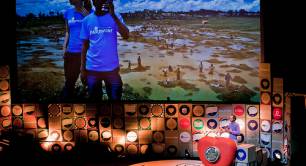SOS via SMS leads to farming success
Peer to peer advice is connecting farmers across the globe thanks to WeFarm.
A new social enterprise is helping farmers in developing countries to become more efficient by enabling information sharing via text messages. It works as a peer-to-peer service. If a farmer has an agricultural problem that is affecting their livelihood, they can send a text to WeFarm, who then distribute it to all the other users. The community of farmers then offers solutions. Should the venture continue to grow at its current rate, it promises not only to have a big effect on farmers’ finances but also global food production.
The growth of WeFarm is what piqued our interest. After starting operations at the beginning of the year, the team got in touch with us in the middle of September because the service had reached a milestone of 15,000 users. By the time we sat down for a chat with founder Kenny Ewan two weeks later, the number had grown to 22,000 and at the time of writing, they're up to 25,000. They’re aiming for 50,000 by Christmas and have a target of a million by the end of next year. The service has received 22,000 questions and around double the amount of answers to date.
Ewan and fellow co-founder Claire Rhodes were both working for Cafédirect Producers Foundation (CPF), a UK charity owned by smallholder farmers. The idea came from his time working in international development. "The inspiration for me was seeing grassroots innovations that people were inventing out of recycled material on a farm to solve some little problem. Five miles down the road someone would have the same problem but that information wouldn’t have travelled. The key thing behind WeFarm is the peer-to-peer element. Harnessing peoples knowledge rather than it coming from the top down was a big part of it.”
We’re not the only people to sit up and take notice. Last year WeFarm were one of four winners of the Google Impact Challenge, which got the team £500,000 of funding and support from the tech giant. Ewan is thankful for the recognition: “It changed everything for us. We’d been struggling for quite a while for someone to back these ideas even though we had proof of concept. Google told us they wanted their funding to create big scale impact and trusted us to know the best way to get there. The reality is we wouldn’t be at 22,000 users and growing fast if they hadn’t come on board.”
The rise of the internet in developed countries has been nothing short of astounding. Citizens now have more access to free knowledge than ever before and more and more of us could not do our jobs without the world wide web. In developing countries, it’s a different story: 75% of the world’s population has no internet access. The reliability of the web across wildly varying geographies means that mobile phone usage is the preferred way of keeping people connected. Radio also has a wide reach – WeFarm have used radio shows to raise awareness of their service with farmers, who can then sign up by text.
The service means that a farmer in Tanzania can exchange ideas with one in Peru. It’s a free service for users as WeFarm pay for the texts. The venture will earn revenue by passing sales leads to local providers (e.g. a farmer might need access to a vet or a fertiliser provider) and selling their data to local food suppliers like supermarkets. In time, the venture should also provide valuable information about amounts of food production. “At a big enough scale we can start to map crop disease or we can look at yield sizes. $94bn of wheat is lost before it gets to post production – often because a lack of infrastructure prevents it from being processed. Another example is coffee rust, which caused $1bn worth of economic damage – that is preventable if farmers have the knowledge of how to deal with it.” Tracking issues such as disease will ultimately also be valuable to governments and NGOs, helping those bodies improve their impact.
Ewan admits to challenges ahead, both in terms of measuring impact and sourcing finance for growth – the ultimate aim is to improve the lives of 10m farmers. Regarding impact, challenges include time scale and climate. Gauging effectiveness will necessarily have to cover the lifetimes of crop production. Any freak weather, such as hurricanes or drought will not only affect the farmers but also their data. Even if shared information has had a positive effect on agricultural production, if a crop is wiped out by weather, that positive impact has been lost. There is also the recognised human trait of fallibility to contend with – farmers may get good advice from their peers but whether they act on it is another matter. WeFarm are looking at monitoring small groups of the proactive users over a year of intervention rather than trying to cover everyone.
Currently WeFarm are looking at both social investors and venture capitalists to provide the financial backing to take the project forward. It is registered as a company limited by shares (with CPF the majority shareholder) so is able to offer equity to people “as long as they buy into the bigger mission” says Ewan. It seems that for the future of better farming, communication will be key.

![[file:field_file_image_alt_text]](https://www.pioneerspost.com/sites/default/files/styles/node-teaser/public/images/article/large%20panda.jpg?itok=X9lvYEKz)

